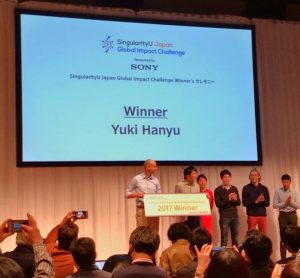Integriculture wins Singularity University’s “Global Impact Challenge”

Yuki Hanyu, the CEO of Integriculture Inc., won the Singularity University’s “Global Impact Challenge(GIC)” for the company’s ambitious plan to drive cellular agriculture.Integriuclture will further the development of low-cost culture medium and scalable cell culture system in order to provide innovative agricultural and medical solutions. Further details are listed below.
————————————————————————————————————————————————————————————————
Yuki Hanyu, the CEO of Integriculture Inc., won the Singularity University’s “Global Impact Challenge(GIC)” for the company’s ambitious plan to drive cellular agriculture.A highly acclaimed contest for high-tech solutions that tackle global issues, GIC selected Integriculture for its vision of providing a sustainable and scalable way of meat production.As a GIC winner, Yuki will be the first Japanese to join the Singularity University’s annual “Global Solution Program”. Integriuclture will further the development of low-cost culture medium and scalable cell culture system in order to provide innovative agricultural and medical solutions.
1. About Singularity University

Singularity University is a global community using exponential technologies to tackle the world’s biggest challenges. Its learning and innovation platform empowers individuals and organizations with the mindset, skill set, and network to build breakthrough solutions that leverage emerging technologies like artificial intelligence, robotics, and digital biology. The Singularity University’s annual Global Solution Program attracts highly ambitious, talented leaders from across the world, with only .02% of all applicants accepted.2. About Global Impact ChallengeGlobal Impact Challenges (GICs) are annual competitions held in partnership with sponsor organizations worldwide and organized by geography and theme. These challenges are an open call to entrepreneurs, leaders, scientists, and engineers with the most innovative ideas for moonshot innovations and startups that can positively impact a billion people in 10 years. The winner of each challenge receives a full sponsorship to attend our transformational Global Solutions Program held on the SU campus at NASA Research Park.3. TechnologyBy providing cultivated meat at an affordable price range, Integriculture aims to eliminate the environmental burdens and public health risks caused by current meat production. To realize its vision, Integriculture is developing low-cost culture medium that makes up most of the raw material costs, as well as scalable cell culture system. It costs several million yen to produce 100 grams of cultivated meat with conventional cell culture method. Therefore, Integriculture developed low-cost, serum-free culture medium and scalable, flow-based cell culture system that together produce 100 grams of cultivated meat for approximately 40,000 yen.4. Future BusinessThe most notable advantage of Integriculture’s low-cost, serum-free culture medium and its patented, scalable cell culture system is their ability to produce large amounts of cultivated meat at low cost. Integriculture has focused on the aforementioned technologies based on its research finding that the greatest challenge for cultivated meat production lies in the scalability of cell culture system as well as the cost reduction of culture medium. Integriculture will leverage the seed round financing to gradually reduce the culture medium cost and scale the culture system. Integriculture aims to prototype cultivated foie gras by 2018 and deliver its first cultivated meat product by 2021. By 2025, Integriculture aspires to produce cultured meat at the costs equivalent to conventional meat to ensure food security and provide sustainable meat supplies for the rapidly growing demand across the world.
■Integriculture IncHeadquarter:Tokyo, JapanCEO:Yuki HanyuWebsite:https://www.integriculture.co
■Global Impact Challenge
URL: http://www.sony.co.jp/SonyInfo/Jobs/singularityuJapanGIC/
Date: February 25th, 2017
【Contact】
Integriculture Inc.(Attn: Yuki Hanyu)
E-mail: info@integriculture.jp
